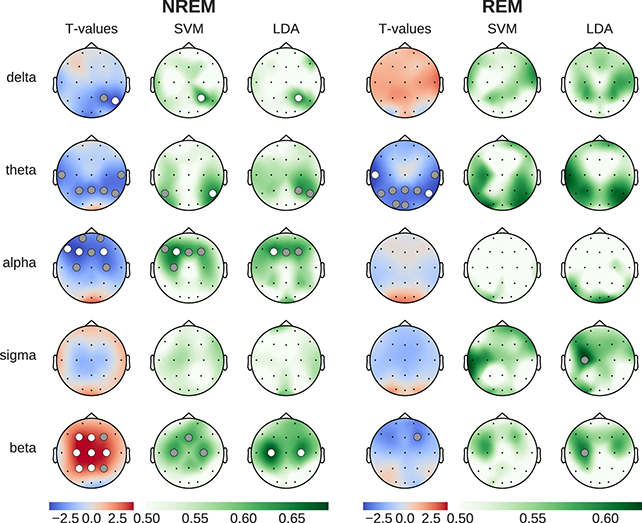We already know that the stimulating powers of caffeine make it an unsuitable choice for a late-night drink – at least if you want to get any shut-eye. But a new study adds a whole extra level of detail to our understanding of caffeine's impact on the brain during sleep.
Caffeine was shown to increase brain signal complexity, and shift the brain closer to a state of 'criticality', in tests run by researchers from the University of Montreal in Canada. This criticality refers to the brain being balanced between structure and flexibility, thought to be the most efficient state for processing information, learning, and making decisions.
However, this state might prevent restful sleep, the researchers suggest. The caffeine isn't just keeping us alert, but actually changing how the brain is operating. What's more, they found younger adults aged 20 to 27 were more greatly affected in this way.
 The researchers analyzed brain activity as the study participants slept. (Thölke et al., Communications Biology, 2025)
The researchers analyzed brain activity as the study participants slept. (Thölke et al., Communications Biology, 2025)Further analysis revealed that caffeine influenced the slow oscillations of electrical activity known as delta, theta, and alpha waves. These are indicators of deeper, more restorative sleep, but caffeine weakened them – especially during the non-rapid eye movement sleep phase the brain uses to fix memories in place and recharge our cognitive functions.
"These changes suggest that even during sleep, the brain remains in a more activated, less restorative state under the influence of caffeine," says neuroscientist Karim Jerbi, from the University of Montreal.
"This change in the brain's rhythmic activity may help explain why caffeine affects the efficiency with which the brain recovers during the night, with potential consequences for memory processing."
For the study, the researchers recruited 40 volunteers, and measured their brain patterns via electroencephalograms (EEGs) across two nights. On one night, the participants were given a placebo, and on the other, a capsule containing 200 milligrams of caffeine (equivalent to about one or two cups of coffee).
A variety of statistical methods was used to validate the results, and to make sure the differences seen in brain activity were related to the caffeine intake – showing that shift towards criticality and more excited neurons.
"While this is useful during the day for concentration, this state could interfere with rest at night," says neuroscientist Julie Carrier, from the University of Montreal.
"The brain would neither relax nor recover properly."
When it comes to the different reactions across different ages, the researchers suggest that changes in the brain as we age might be responsible.
Adenosine molecules gradually build up in the brain during the day, leading to a greater feeling of fatigue as bedtime approaches. Caffeine works by blocking the receptors that adenosine interacts with, giving us a temporary jolt of energy.
Adenosine receptors are more abundant in younger brains, which may explain why younger people seem to be more sensitive to caffeine's powers. That includes both the positive energizing effects, and the negative effects of keeping the brain too active overnight.
"Caffeine is a psychoactive stimulant that is consumed by people across all age groups on a daily basis through a wide variety of products such as coffee, tea, soft drinks, energy drinks, chocolate, and several pharmaceutical drugs," write the researchers in their published paper.
"It is therefore critical to understand how caffeine affects the brain during sleep, and across age."
The research has been published in Communications Biology.

.jpg) 3 hours ago
1
3 hours ago
1
 English (US)
English (US)